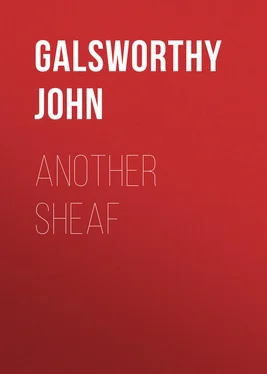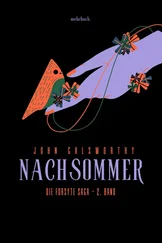John Galsworthy - Another Sheaf
Здесь есть возможность читать онлайн «John Galsworthy - Another Sheaf» — ознакомительный отрывок электронной книги совершенно бесплатно, а после прочтения отрывка купить полную версию. В некоторых случаях можно слушать аудио, скачать через торрент в формате fb2 и присутствует краткое содержание. Жанр: foreign_antique, foreign_prose, essays, на английском языке. Описание произведения, (предисловие) а так же отзывы посетителей доступны на портале библиотеки ЛибКат.
- Название:Another Sheaf
- Автор:
- Жанр:
- Год:неизвестен
- ISBN:нет данных
- Рейтинг книги:5 / 5. Голосов: 1
-
Избранное:Добавить в избранное
- Отзывы:
-
Ваша оценка:
- 100
- 1
- 2
- 3
- 4
- 5
Another Sheaf: краткое содержание, описание и аннотация
Предлагаем к чтению аннотацию, описание, краткое содержание или предисловие (зависит от того, что написал сам автор книги «Another Sheaf»). Если вы не нашли необходимую информацию о книге — напишите в комментариях, мы постараемся отыскать её.
Another Sheaf — читать онлайн ознакомительный отрывок
Ниже представлен текст книги, разбитый по страницам. Система сохранения места последней прочитанной страницы, позволяет с удобством читать онлайн бесплатно книгу «Another Sheaf», без необходимости каждый раз заново искать на чём Вы остановились. Поставьте закладку, и сможете в любой момент перейти на страницу, на которой закончили чтение.
Интервал:
Закладка:
John Galsworthy
Another Sheaf
THE ROAD
The road stretched in a pale, straight streak, narrowing to a mere thread at the limit of vision – the only living thing in the wild darkness. All was very still. It had been raining; the wet heather and the pines gave forth scent, and little gusty shivers shook the dripping birch trees. In the pools of sky, between broken clouds, a few stars shone, and half of a thin moon was seen from time to time, like the fragment of a silver horn held up there in an invisible hand, waiting to be blown.
Hard to say when I first became aware that there was movement on the road, little specks of darkness on it far away, till its end was blackened out of sight, and it seemed to shorten towards me. Whatever was coming darkened it as an invading army of ants will darken a streak of sunlight on sand strewn with pine needles. Slowly this shadow crept along till it had covered all but the last dip and rise; and still it crept forward in that eerie way, as yet too far off for sound.
Then began the voice of it in the dripping stillness, a tramping of weary feet, and I could tell that this advancing shadow was formed of men, millions of them moving all at one speed, very slowly, as if regulated by the march of the most tired among them. They had blotted out the road, now, from a few yards away to the horizon; and suddenly, in the dusk, a face showed.
Its eyes were eager, its lips parted, as if each step was the first the marcher had ever taken; and yet he was stumbling, almost asleep from tiredness. A young man he was, with skin drawn tight over his heavy cheek-bones and jaw, under the platter of his helmet, and burdened with all his soldier's load. At first I saw his face alone in the darkness, startlingly clear; and then a very sea of helmeted faces, with their sunken eyes shining, and their lips parted. Watching them pass – heavy and dim and spectre-like in the darkness, those eager dead-beat men – I knew as never before how they had longed for this last march, and in fancy seen the road, and dreamed of the day when they would be trudging home. Their hearts seemed laid bare to me, the sickening hours they had waited, dreaming and longing, in boots rusty with blood. And the night was full of the loneliness and waste they had been through…
Morning! At the edge of the town the road came arrow-straight to the first houses and their gardens, past them, and away to the streets. In every window and at each gate children, women, men, were looking down the road. Face after face was painted, various, by the sunlight, homely with line and wrinkle, curve and dimple, pallid or ruddy, but the look in the eyes of all these faces seemed the same. "I have waited so long," it said, "I cannot wait any more – I cannot!" Their hands were clasped, and by the writhing of those hands I knew how they had yearned, and the madness of delight waiting to leap from them – wives, mothers, fathers, children, the patient hopers against hope.
Far out on the road something darkened the sunlight. They were coming!
THE SACRED WORK
The Angel of Peace, watching the slow folding back of this darkness, will look on an earth of cripples. The field of the world is strewn with half-living men. That loveliness which is the creation of the æsthetic human spirit; that flowering of directed energy which we know as civilisation; that manifold and mutual service which we call progress – all stand mutilated and faltering. As though, on a pilgrimage to the dreamed-of Mecca, water had failed, and by the wayside countless muffled forms sat waiting for rain; so will the long road of mankind look to-morrow.
In every township and village of our countries men stricken by the war will dwell for the next half-century. The figure of Youth must go one-footed, one-armed, blind of an eye, lesioned and stunned, in the home where it once danced. The half of a generation can never again step into the sunlight of full health and the priceless freedom of unharmed limbs.
So comes the sacred work.
Can there be limit to the effort of gratitude? Niggardliness and delay in restoring all of life that can be given back is sin against the human spirit, a smear on the face of honour.
Love of country, which, like some little secret lamp, glows in every heart, hardly to be seen of our eyes when the world is at peace – love of the old, close things, the sights, sounds, scents we have known from birth; loyalty to our fathers' deeds and our fathers' hopes; the clutch of Motherland – this love sent our soldiers and sailors forth to the long endurance, to the doing of such deeds, and the bearing of so great and evil pain as can never be told. The countries for which they have dared and suffered have now to play their part.
The conscience of to-day is burdened with a load well-nigh unbearable. Each hour of the sacred work unloads a little of this burden.
To lift up the man who has been stricken on the battlefield, restore him to the utmost of health and agility, give him an adequate pension, and re-equip him with an occupation suited to the forces left him – that is a process which does not cease till the sufferer fronts the future keen, hopeful, and secure. And such restoration is at least as much a matter of spirit as of body. Consider what it means to fall suddenly out of full vigour into the dark certainty that you can never have full strength again, though you live on twenty, forty, sixty years. The flag of your courage may well be down half-mast! Apathy – that creeping nerve disease – is soon your bed-fellow and the companion of your walks. A curtain has fallen before your vision; your eyes no longer range. The Russian "Nichevo" – the "what-does-it-matter?" mood – besets you. Fate seems to say to you: "Take the line of least resistance, friend – you are done for!" But the sacred work says to Fate: " Retro, Satanas! This our comrade is not your puppet. He shall yet live as happy and as useful – if not as active – a life as he ever lived before. You shall not crush him! We shall tend him from clearing station till his discharge better than wounded soldier has ever yet been tended. In special hospitals, orthopædic, paraplegic, phthisic, neurasthenic, we shall give him back functional ability, solidity of nerve or lung. The flesh torn away, the lost sight, the broken ear-drum, the destroyed nerve, it is true, we cannot give back; but we shall so re-create and fortify the rest of him that he shall leave hospital ready for a new career. Then we shall teach him how to tread the road of it, so that he fits again into the national life, becomes once more a workman with pride in his work, a stake in the country, and the consciousness that, handicapped though he be, he runs the race level with his fellows, and is by that so much the better man than they. And beneath the feet of this new workman we shall put the firm plank of a pension."
The sacred work fights the creeping dejections which lie in wait for each soul and body, for the moment stricken and thrown. It says to Fate: "You shall not pass!"
And the greatest obstacle with which it meets is the very stoicism and nonchalance of the sufferer! To the Anglo-Saxon, especially, those precious qualities are dangerous. That horse, taken to the water, will too seldom drink. Indifference to the future has a certain loveability, but is hardly a virtue when it makes of its owner a weary drone, eking out a pension with odd jobs. The sacred work is vitally concerned to defeat this hand-to-mouth philosophy. Side by side in man, and especially in Anglo-Saxon, there live two creatures. One of them lies on his back and smokes; the other runs a race; now one, now the other, seems to be the whole man. The sacred work has for its end to keep the runner on his feet; to proclaim the nobility of running. A man will do for mankind or for his country what he will not do for himself; but mankind marches on, and countries live and grow, and need our services in peace no less than in war. Drums do not beat, the flags hang furled, in time of peace; but a quiet music is ever raising its call to service. He who in war has flung himself, without thought of self, on the bayonet and braved a hail of bullets often does not hear that quiet music. It is the business of the sacred work to quicken his ear to it. Of little use to man or nation would be the mere patching-up of bodies, so that, like a row of old gossips against a sunlit wall, our disabled might sit and weary out their days. If that were all we could do for them, gratitude is proven fraudulent, device bankrupt; and the future of our countries must drag with a lame foot.
Читать дальшеИнтервал:
Закладка:
Похожие книги на «Another Sheaf»
Представляем Вашему вниманию похожие книги на «Another Sheaf» списком для выбора. Мы отобрали схожую по названию и смыслу литературу в надежде предоставить читателям больше вариантов отыскать новые, интересные, ещё непрочитанные произведения.
Обсуждение, отзывы о книге «Another Sheaf» и просто собственные мнения читателей. Оставьте ваши комментарии, напишите, что Вы думаете о произведении, его смысле или главных героях. Укажите что конкретно понравилось, а что нет, и почему Вы так считаете.












